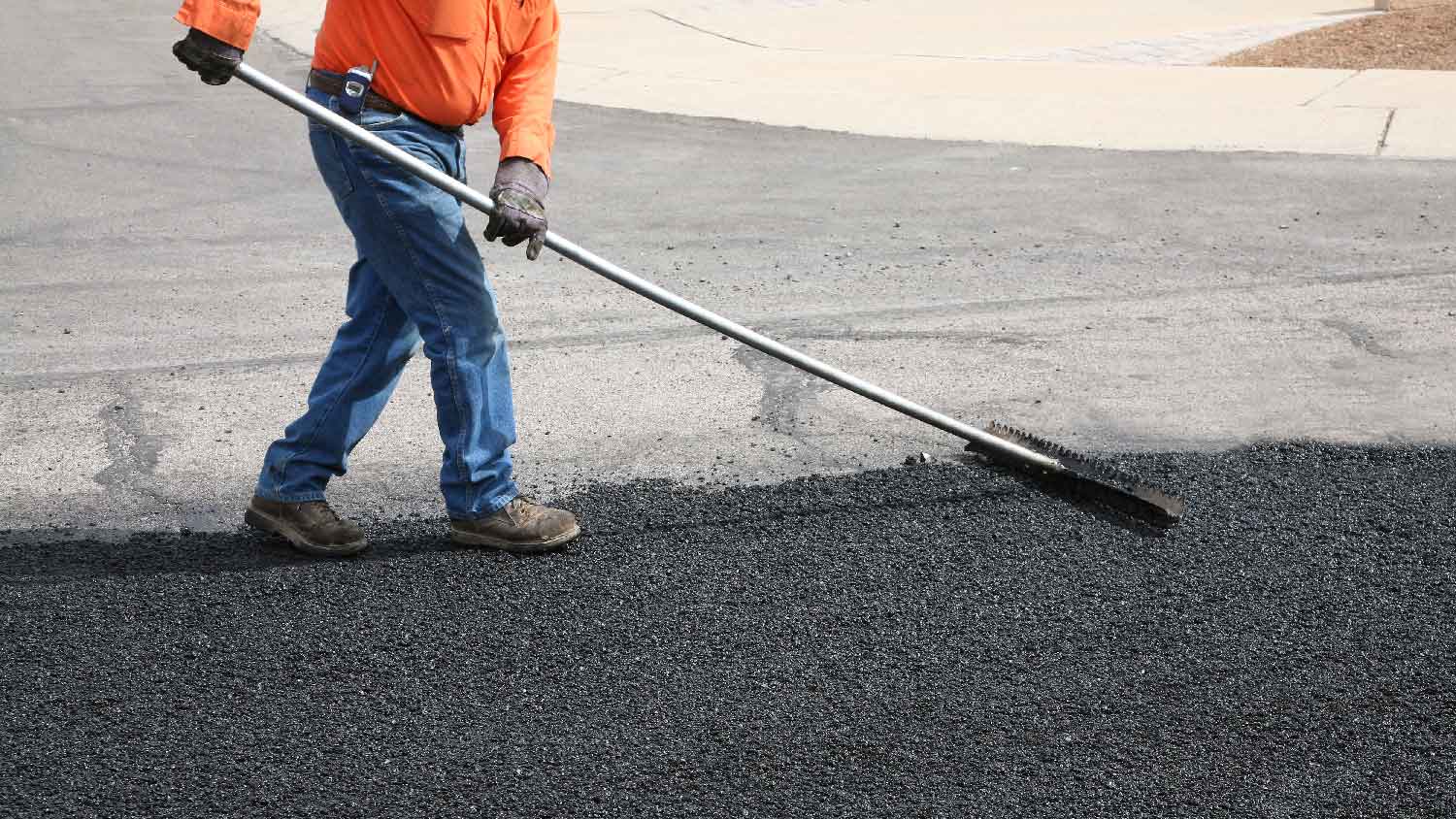What Is Asphalt, What’s It Made Of, and What Is It Used For?
Asphalt is a common paving material for driveways, roadways, sidewalks, and parking lots


Asphalt is a paving material commonly used for roads, driveways, walkways, and even roof shingles.
Asphalt is made of aggregate materials, like gravel and sand, and bitumen.
Asphalt has several pros, including flexibility and affordability.
Asphalt does have some downsides to consider, however.
Asphalt is an incredibly common material that we walk and drive on every day. Asphalt covers our highways and city streets, our bike paths and race tracks, our parking lots and sidewalks, and even our airport runways and our roofs. But what is asphalt made of?
Below, we’ll define asphalt, discuss its common uses, and review its pros and cons.
What Is Asphalt?
Asphalt is a composite material used for paving surfaces for walking and driving. It is made of aggregate materials—such as crushed rocks, sand, and gravel—and bitumen, a sticky, petroleum-based substance. The ratio is typically 95% aggregates and 5% bitumen. When mixed together at high temperatures, these materials form a highly effective (and affordable) paving material.
Asphalt may also contain additives, such as polymers, rejuvenators, mineral fillers, and polyphosphoric acid, to increase its performance.
What Is Asphalt Used For?
Asphalt is a highly versatile paving material that can be used for a variety of public, commercial, and residential uses, including:
Roadways
Driveways
Sidewalks
Parking lots
Play areas
Sport surfaces
Bike paths
Airport runways
Race tracks
Roofs
Flooring
Railway tracks
Ports
Landfill caps
Asphalt Alternatives
Asphalt is a common driveway paving material, but it’s not your only option. Here are some other ways you can pave your driveway or walkway at home:
Concrete: Durable, versatile, and common, though it requires a fair amount of maintenance.
Gravel: Permeable and easy to install, but can be tricky with steep slopes
Brick: Elegant and durable, but expensive
Pros and Cons of Asphalt

Asphalt is a great driveway material with plenty of benefits, but there are also some disadvantages to consider.
Asphalt Advantages
Affordable: The cost to install an asphalt driveway is more affordable than that of a concrete or brick driveway.
Easy to install: Asphalt driveway installation is fast and easy. You should be able to drive on your asphalt within a day of installation. A local asphalt company can tackle the job in a single day.
Easy to maintain: Asphalt maintenance is easy; the main task is resealing. You may need to resurface and repair cracks over time. Asphalt driveway repair costs $2,450 on average.
Durable and flexible: Asphalt is a great paving material because it’s highly resistant to weather, including rain, snow, and extreme temperatures. It’s less likely than concrete to crack over time.
Asphalt Downsides
Amount of maintenance: Asphalt maintenance may be easy, but the material also requires more frequent maintenance than some other materials.
Longevity: Asphalt driveways last 15 to 30 years—not bad, but still shorter than the typical lifespan for concrete driveways.
Frequently Asked Questions
Asphalt is made of aggregate materials (sand, rocks, and gravel) and bitumen, a viscous, petroleum-based, waterproof substance. These materials are mixed together at extremely high temperatures to form asphalt.
Blacktop is a type of asphalt, but you shouldn’t use the term interchangeably—because not all asphalt qualifies as blacktop. Blacktop uses much more stone than other types of asphalt.
Asphalt is not a type of concrete. While both are a common type of pavement, asphalt is composed of aggregates (like sand and gravel) and bitumen; concrete is a mixture of cement, aggregates, and water. Here are some of the key differences between asphalt and concrete driveways.














